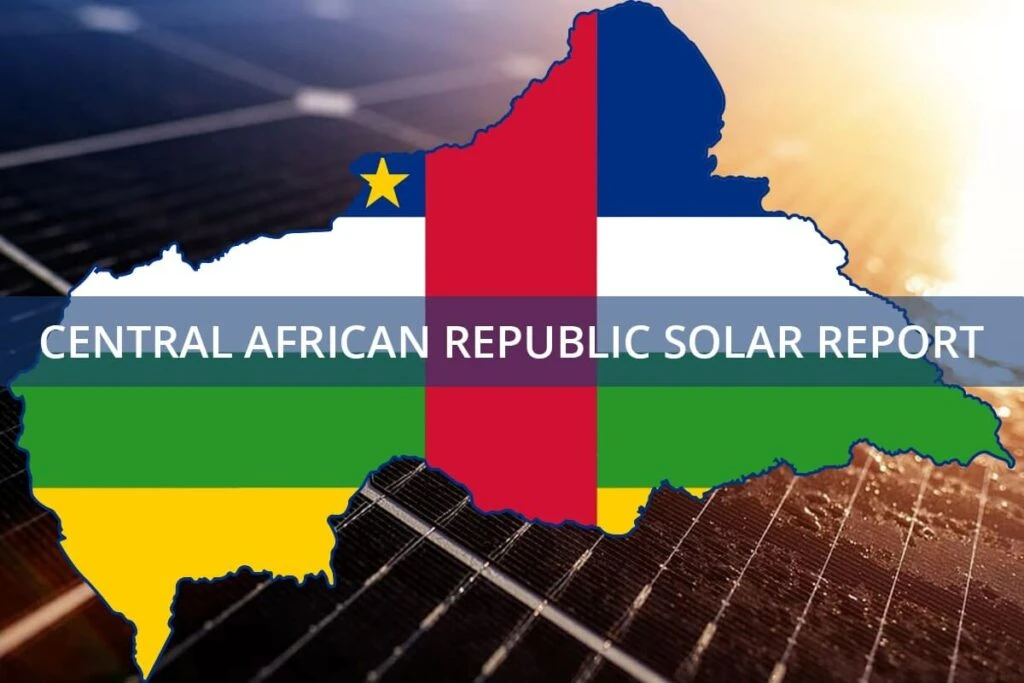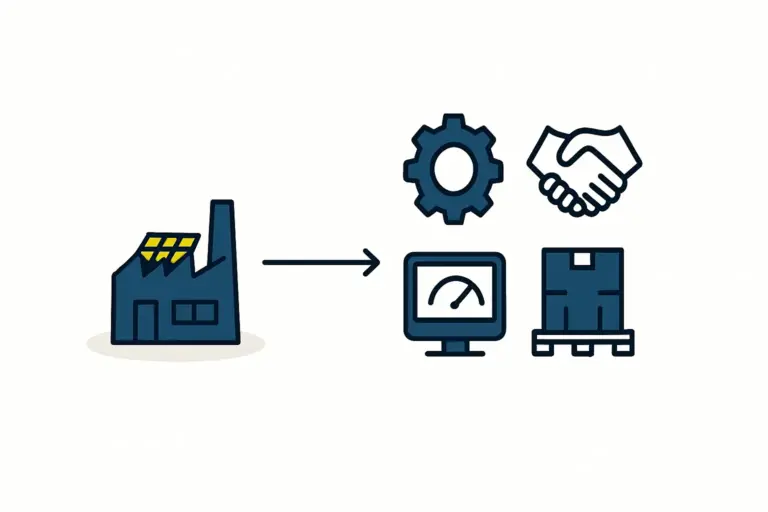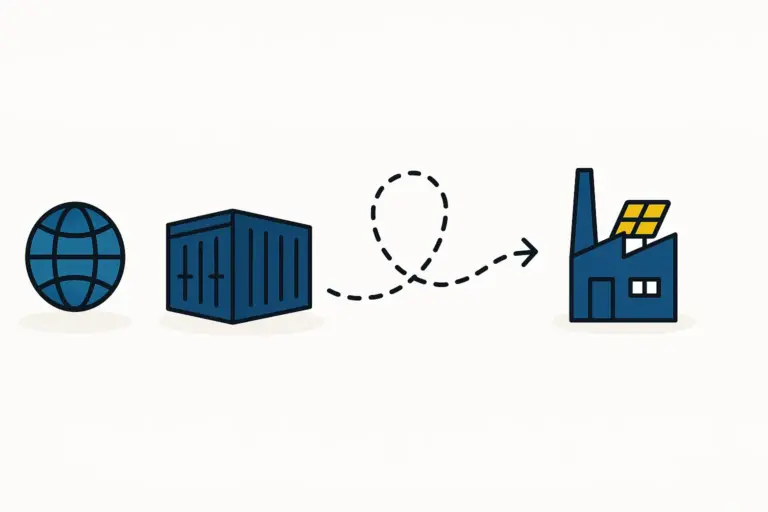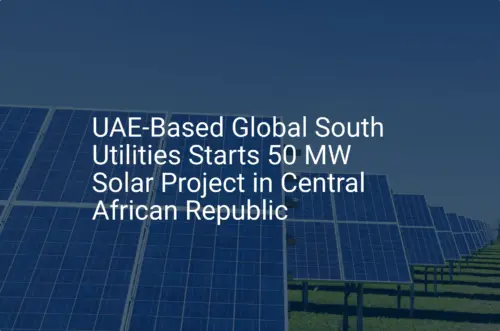Entering a market like the Central African Republic (CAR) presents a unique mix of challenges and opportunities. For an entrepreneur considering a solar module factory in the capital, Bangui, the landscape can seem daunting. The country’s ranking of 184th out of 190 economies in the World Bank’s 2020 Ease of Doing Business report underscores the need for careful navigation.
These challenges, however, are surmountable for the well-prepared investor, revealing significant potential in a region with abundant solar resources and growing energy demand.
This guide outlines the legal and administrative requirements for establishing a solar manufacturing entity in Bangui. It is designed for professionals who are experts in their own fields but new to the specifics of forming a company in the CAR. Our goal is to provide a clear, actionable roadmap that turns bureaucratic complexities into a manageable, step-by-step process.
Table of Contents
Understanding the Business Landscape in the Central African Republic
Industrial investors should first understand that the Central African Republic’s economy has traditionally relied on primary sectors like agriculture and mining. Its administrative framework is less streamlined than in more developed economies—a factor reflected in its business rankings.
However, the government has expressed a clear interest in diversifying the economy and attracting foreign investment, particularly in strategic sectors like renewable energy. The CAR’s Investment Charter provides a legal framework for these incentives, offering foundational support for new enterprises. Success depends on meticulous planning and a clear grasp of on-the-ground realities, from logistical hurdles to the nuances of regulatory compliance.
Step 1: Choosing the Right Legal Structure
The first major decision is selecting the appropriate legal entity for the solar factory. For foreign investors in the CAR, the two most common structures are both governed by the OHADA (Organisation pour l’Harmonisation en Afrique du Droit des Affaires) uniform acts.
Société à Responsabilité Limitée (SARL) – Limited Liability Company
A SARL is often a good fit for small to medium-sized enterprises. It offers a flexible structure with limited liability for its members, meaning their personal assets are protected from business debts.
- Shareholders: Can be established by a single person (SARL Unipersonnelle) or multiple partners.
- Minimum Capital: The minimum share capital is determined by the partners in the articles of association, which allows for flexibility. While a common starting point under OHADA law is around XAF 1,000,000 (approx. USD 1,650), a higher amount is recommended to establish credibility for an industrial project.
- Best For: Entrepreneurs or small partnerships seeking a straightforward structure with liability protection.
Société Anonyme (SA) – Public Limited Company
An SA is a more robust structure designed for larger investments and is often required for significant industrial projects or those planning to seek broader financing.
- Shareholders: Requires at least one shareholder.
- Minimum Capital: A minimum share capital of XAF 10,000,000 (approx. USD 16,500) is required if the company does not make a public offering.
- Management: Requires a Board of Directors, making it more formally structured than a SARL.
- Best For: Larger-scale operations, joint ventures, or businesses planning for future expansion and significant capital-raising activities. The investment required for a 50 MW solar factory often aligns better with the SA structure.
Step 2: The Business Registration Process at the Guichet Unique
The CAR has established a “Guichet Unique de Formalités des Entreprises” (GUFE), a one-stop shop designed to simplify the registration process. Although challenges can still arise, the GUFE centralizes most of the required formalities.

The Procedural Workflow:
- Engage a Local Notary: A public notary is essential for drafting the company’s statutes (articles of association) and certifying all required documentation. The statutes define the company’s purpose, management structure, and operational rules.
- Deposit Share Capital: The initial share capital must be deposited into a dedicated bank account in the CAR. The bank will then issue a certificate of deposit, a mandatory document for registration.
- Compile the Registration File: A comprehensive file must be submitted to the GUFE. Key documents typically include:
- Completed application forms.
- Notarized company statutes.
- Bank certificate of capital deposit.
- Passport copies and proof of address for all directors and shareholders.
- A non-conviction certificate (criminal record check) for the company manager(s), which must typically be less than three months old.
- A lease agreement or title deed for the factory’s proposed premises in Bangui.
- Submission and Processing at GUFE: The Guichet Unique handles registration with several key bodies simultaneously:
- Registre du Commerce et du Crédit Mobilier (RCCM): The Trade and Personal Property Credit Register, which officially records the company’s existence.
- Numéro d’Identification Fiscale (NIF): The tax identification number.
- Social Security Registration (CNSS): Registration with the national social security fund.
- Publication: Following registration, an announcement of the company’s formation must be published in a journal of legal notices.
Based on experience from similar projects in emerging markets, this process can take anywhere from four to eight weeks, though administrative delays are always possible. Meticulous preparation of all documents is the most effective way to prevent delays.
Step 3: Securing Essential Permits for a Manufacturing Facility
Company registration is only the first phase. A manufacturing plant requires specific operational permits before it can be built and begin production.
Construction Permit
Before any construction or significant renovation can begin at the factory site, a building permit must be obtained from the municipal authorities in Bangui. This process requires submitting detailed architectural and structural plans, which should be defined during your solar factory layout and design phase.
Environmental Impact Assessment (EIA)
An Environmental Impact Assessment (EIA) is mandatory for all industrial projects in the CAR. This comprehensive study assesses the factory’s potential environmental effects, from waste disposal to resource consumption. The Ministry of Environment must approve the EIA report before issuing an environmental compliance certificate—a critical step that also demonstrates a commitment to sustainable operations.
Operating License
Once the facility is built and equipped, an application for an operating license must be submitted to the Ministry of Commerce and Industry. This often involves an inspection of the premises to ensure compliance with health, safety, and technical standards relevant to manufacturing. The selection of solar manufacturing equipment plays a key role here, as certified and compliant machinery can expedite this approval.

Leveraging the CAR Investment Charter
The CAR Investment Charter is a critical tool for foreign investors, offering a range of incentives to attract capital into priority sectors like energy. Key benefits may include:
- Customs and Tax Exemptions: Potential exemptions from customs duties and VAT on the importation of necessary production machinery and equipment.
- Tax Holidays: Possible exemption from corporate income tax for a specified number of years during the initial operational period.
To take advantage of the Charter, a separate application must be submitted to the National Investment Promotion Agency (ANIE). This application must include a detailed business plan demonstrating the project’s economic benefits, such as job creation and its contribution to the local energy supply.
FAQ: Common Questions on Establishing a Business in Bangui
Q: How long does the entire registration and permitting process take?
A: While company registration itself may take four to eight weeks, the full process—including securing all necessary permits for a factory—can realistically take six to 12 months. Proactive engagement and professional follow-up are key.
Q: What are the primary unforeseen challenges for new investors?
A: Beyond the documented administrative procedures, logistical challenges tied to infrastructure can cause delays. Navigating bureaucratic processes also requires persistence and, in many cases, the support of a local legal advisor or consultant who understands the system.
Q: Is a local partner required to start a business in the CAR?
A: There is no legal requirement for a foreign investor to have a local partner. However, a reliable local contact or representative can be invaluable for navigating administrative nuances and understanding the local business culture.
Q: How does political instability affect business operations?
A: Political instability is a significant risk factor that must be built into any business plan. This includes securing assets, ensuring supply chain resilience, and having contingency plans. Investors should stay informed through reliable channels and build strong local relationships. A structured approach, such as the one offered in the pvknowhow.com free course on starting a solar business, can help investors prepare for such risks.
Next Steps on Your Journey
Establishing a solar factory in Bangui is a formidable yet achievable goal. The process demands a methodical approach, a patient outlook, and an appreciation for the local regulatory environment. By breaking the journey down into distinct stages—legal structure, registration, permitting, and leveraging incentives—an investor can move forward with confidence.
With the legal framework in place, the next steps involve detailed technical and financial planning. This includes finalizing the factory layout, selecting the right equipment, and developing a comprehensive operational strategy.






